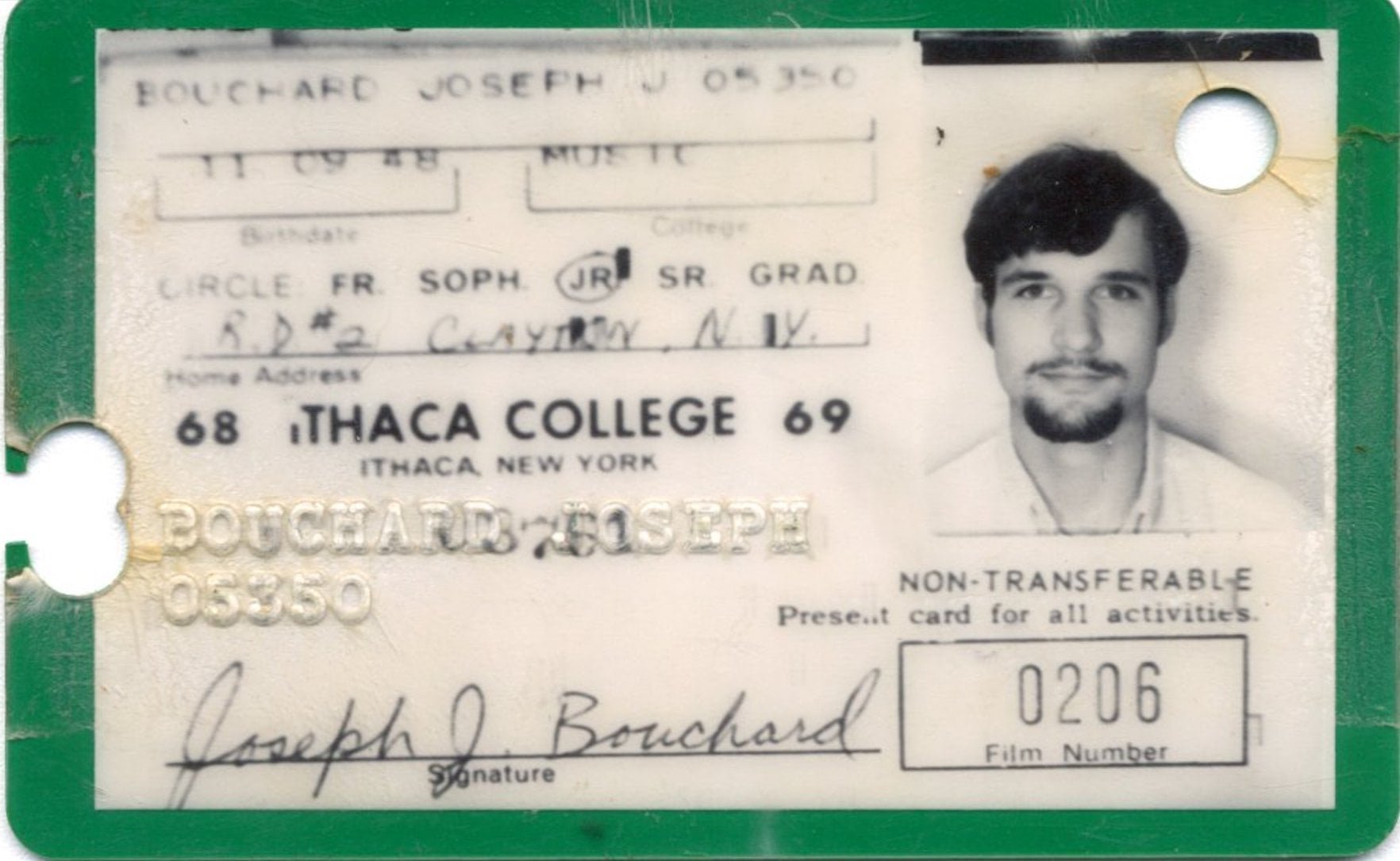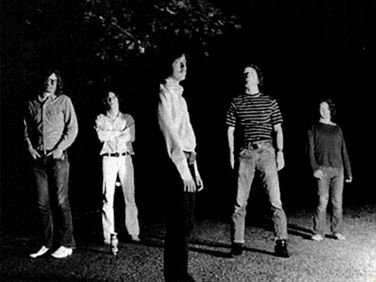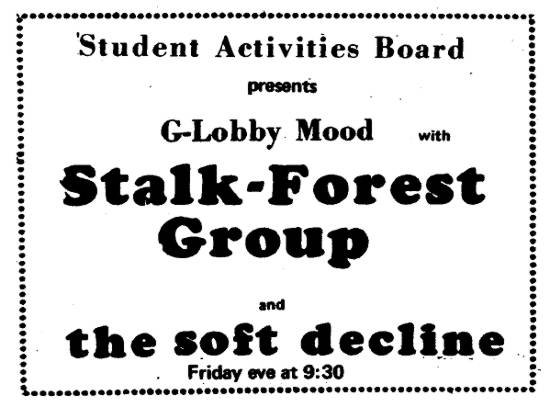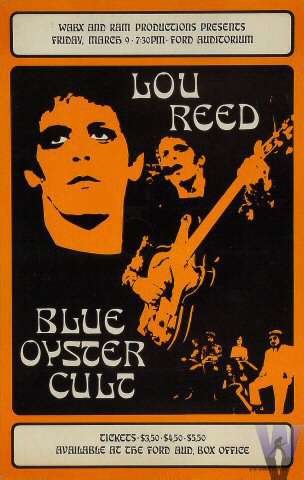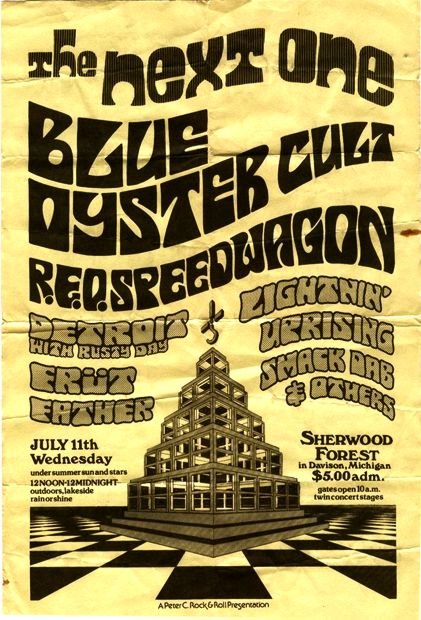Joe Bouchard - Blue Oyster Cult
What was growing up like for you? Tell me about growing up on a farm in Clayton, NY with your other six siblings. What were those early days like? When did you first become interested in music and what was it about the bass guitar that initially fascinated you? What was it about the piano that initially fascinated you?
Born in Watertown, NY on the 9th of November 1948. I grew up in a large family with five brothers and one sister. It was a bit hectic in our earliest days. My father learned electronics and radio engineering in the Merchant Marines during World War II. He met my mother in Boston at a serviceman’s dance. Being Irish from Cambridge MA she probably dreamed she of having a big family. She and my dad both came from big families with 6 and 7 siblings, respectively. In 1952 when I was 4 years old my dad took a job as a broadcast engineer for the U.S. Government’s Voice of America in Greece. We uprooted from upstate NY and moved to Greece where we were the well-off Americans in comparison to the mostly poor Greek people. We had a fenced-in house with a gardener and a housekeeper. I remember traipsing around the ancient ruins of Greece with my mom and brother Albert and baby brother Bill and baby sister Mary is tow. After a year of living overseas, we moved back to the USA and my dad got a job working for the local TV station in Watertown NY.
Left to right - Pat, Jerry, Jim, Mary, Bill, Joe and Albert.
He bought a modest farm in Clayton NY, his original hometown, and we became vegetable farmers as our side job. At the age of nine our mom insisted we take piano lessons. I took lessons from the nuns in the local Catholic elementary school. At age ten I took trumpet lessons and played trumpet all through high school. My uncle Bill was a big influence. He could play the piano and trumpet, but most importantly he played the electric jazz guitar. He’d play local jazz gigs on weekends with his buddies. I was fascinated with his talents and during my days in junior high school, he let myself and my cousin borrow his guitars and amp, and we’d play at teen dances. Our first paid gig was for our local boy scout troop. It was a whole different world playing rock and roll music for our peers rather than doing piano recitals and band concerts with the school. From our first song we played at the rock and roll dance all the young girls started dancing. It was crazy! From that moment I was hooked on playing rock and roll music. In those days I’d play guitar, and piano if there was one available.
The Bouchards.
I played piano in the style of Jerry Lee Lewis, but when there where was no piano, I’d play all guitar like the instrumental sounds of the Ventures. Eventually got bitten by the surf craze and the Beach Boys became our idols. Not too long after that the Beatles arrived in the USA, and we played all their music too. Soon to follow were all the British Invasion band like the Rolling Stones, Kinks and many more. It was loads of fun. In our first band, The Regal Tones, we had a neighbor Eddie who played bass guitar. Eddie was a fantastic player who played with a deep solid sound. I didn’t need to play any bass in those days. 7 years later I become a bass player in college where I played bass guitar in the latin jazz band. That band had written out parts which I could sight read. That band called Que Pasa was mostly older players that me, and I learned a lot of good bass habits with them.
Albert Bouchard on drums, Ed Bazinet on guitar bass, and Joe Bouchard on piano. Photo from early high school at Clayton Central.
You and your brother Albert started The Regal Tones together that also included some of your neighbors as members. Can you tell me about forming this group and quickly converting the barn on the farm into a dance hall? What did your parents think of all this? Were they pretty supportive? You guys played dances, block parties and were even on a TV station where your father, Robert, worked. Can you tell me about what some of those experiences were like for you at an early age?
Ah, the Regal Tones became local legends in our little town of Clayton. We played a ton of school dances and parties. Our biggest achievement was playing the Battle of Bands at the Olympic Theater in the “big town” of Watertown. We were the underdogs since there were a lot of good local bands in the running. The preliminaries went on for three weekends and finally in the end we ending up winning first place. If you’ve seen the movie School of Rock you know what I mean, except we ended up winning. When we were young teenagers, we converted our barn into a dance hall and we would put on barn dances for all our friends. That was really fun and we’d end up packing the barn on a Saturday night, and rocking out with all our friends. Our parents we ever supportive of our musical endeavors. My dad took tickets at the door and counted the money, and my mom ran the concession stand with popcorn and lemonade. People still talk about Bouchard’s Barn Dances to the present day!
License for Dance Hall circa: August 20th, 1964.
Tell me about auditioning in high school on the piano for the Ithaca College School Of Music. What was it about music that made you fall in love with it? When did you realize this wasn't just some hobby? Soon after you graduated with a bachelor's degree in Music Education. What was your overall goal, or vision whilst going to school?
As I got closer to going to college I had to choose what I wanted to study. Music was the only choice for me. In the summer of 1965 I took a summer program in music at Fredonia State College for a couple of weeks. I did very well in this summer workshop and I think that made me certain that I could succeed in music and have a career. I was mostly into guitar at that time, but guitar wasn’t considered a proper instrument to study in a music school. I had to choose either singing, or piano, or trumpet. My singing wasn’t very strong, nor my trumpet technique, that left piano. I went to my old piano teacher, a nun in her 80s, and Sister George said “Sure you can study piano in college”. Little did I know how hard it would be. I just squeaked by my piano audition at Ithaca. Their music school was going through an expansion and they had just moved to a brand new campus. I think they were looking for warm bodies, and I fit the bill.
The Regal Tones circa: March 20th, 1965.
I got to college in the fall of 1966 and did okay my first year, my teachers were very patient with me. I had to go back to square one to learn the piano basics just to catch up to the other students. I slogged my way through the curriculum and did fine in the end. Ithaca was a great place to study and I ended up gigging a lot and making connections that would help me with my later career. Part of my activities at Ithaca was working with the theater department. They did a lot of musicals and often needed piano accompanists. After I graduated I ended up being the musical director of a summer theater on Martha’s Vineyard that was sponsored by the college. That was a fun. I actually had one week to teach all the actors their parts for the musicals. During the odd weeks I acted in straight plays. Needless to say my acting was terrible, but I held up the music for the shows pretty well.
Bouchard’s college I.D. card from when he intended Ithaca College circa: 1968/69.
Joe singing with his "Rock Ensemble" at ITHACA COLLEGE circa: 1969.
In 1970 you received a rather important phone call from your brother Albert that the band was in desperate need of a new bassist. Can you tell me about that? What were your first impressions of the other guys in Soft White Underbelly? If you had never received that phone call, what path, in terms of pursuing music, do you think you would have gone? What led to the band being dropped from Elektra?
Okay, I was living in a boarding house in Oak Bluffs on Martha’s Vineyard and at 3 AM one night the woman who ran the place woke me up and said there was a phone call from my brother. I answered the call and it was Albert saying they wanted me to play bass because there was a tour with Led Zeppelin booked and things weren’t working out with their current bass player. I was planning on moving to NYC at the end of the summer, so this was fine by me. I’d join the band and hoped to start the tour on Labor Day of 1970. On Labor Day I drove my Ford Econo-Line van all the way from Martha’s Vineyard to Great Neck Long Island. I was the worst traffic I’d ever experienced. I got to the band house and said to Albert and the guys I was ready to start touring. They told me the tour was cancelled. I was pissed, but I still wanted to join the band anyway. I knew the guys in the band for a long time before joining the group.
Don, AKA Buck Dharma, I knew since 1965 when he met up with Albert at Clarkson College where they were both engineering students. His guitar playing was simply awesome. I never heard a guitarist with that much talent and originality. Eric Bloom I met in the summer of 1967 up in the 1000 Islands area where I’m from. He was playing in a cover band. I thought he was a strong singer and, honestly, the best musician in the Lost and Found as they called themselves. Allen I didn’t know too well, but when I was a college student in Ithaca I booked the Soft White Underbelly for a few gigs and got to know them more that weekend. It was an easy for me to join the band. I had two years experience playing bass in college, and I thought I knew what the band needed to become successful. It was a good band but needed a solid foundation.
Soft White Underbelly.
I might add I was the right height, 5 foot 3, to be in the band since Blue Öyster Cult guys were generally short in stature. The bass player before me was 6 feet 4 and it just didn’t look right! If they never called me to join the band I still would have ended up a musician. I planned to move to NYC and go pro after college. I was always confident in my ability to fit into most situations, and was a good team player. The week after I joined the band we received a telegram (yes, an old fashioned telegram like you see in the movies) from Elektra saying we were “off the label”. I was pissed because they never gave me a chance. Maybe the guys knew it was coming since they tried to make two different albums and the albums were never finished. I think Jac Holtzman just thought they would never make it. I thought otherwise, but we had to go back to square one and start over.
Prior to BOC the band was also called Stalk Forest Group circa: 1971.
You guys began touring and playing local shows in NY as well as PA and New England. What was this time like for you and the guys? Writing original material that would later become BOC’s first LP, what was the band’s process and approach to music? How did meeting up with Clive Davis to record some demos as well as a live audition come about? What tunes did you guys decide on to play? How did the deal go down with Columbia records around this time? What was this experience like for you to sign to one of the biggest labels around?
After being dumped by Electra we felt that we had to put some roadwork in to increase our skills in front of an audience. That meant playing more cover tunes, and working the crowd to make an impression and it worked. We had a pretty crazy agent called Phil King. He put us in all of these little towns through Pennsylvania he would just hop in his Lincoln Continental Drive from club to club and try to get us booked and it worked. We thought we’d make a good living at this but in reality we just crashed on a lot of floors, and ate a lot of diner food. When we came back after the tour there was no money left. We did work on songs during that time and we rearranged some of the older songs to work in the clubs. At one of the shows we played up in the Catskills was at a summer camp that was closed for the fall. It was there at this adult party weekend we met David Lucas.
Phil King and his Lincoln Continental - by Jeff Hayes.
Phil and BOC - by Jeff Hayes.
Handbill circa: April 1st, 1972.
What was the process of recording the band’s first album ‘Blue Oyster Cult’? What was it like to work with producer Murray Krugman and co-producer David Lucas? How did you guys decide to use the work of Bill Gawlik for the album cover? How did the band’s symbol come to be?
We recorded the first Blue Öyster Cult album in David Lucas’s studio called the Warehouse on 47th Street in NYC. It was in the heart of the theater district in New York. The building was actually in a spice warehouse, and David had a lease on the top two floors for his advertising jingle studio. Dave had a great commercial sense and was a well educated musician. It was like a trip to another world. We’d get in the elevator and it had all these exotic spice smells. We’d get to the top and that’s where the magic happened. Sandy Pearlman and his partner, Murray, were our “Producers” and made a lot of suggestions as to what and how we should record. Their role was more conceptual than the nuts and bolts of making a musical record. David was the real musician and could talk to us in real music terms. It was a good team. Bill Gawlik was a student at Stony Brook University and Sandy met him there. Actually the cover of our album was his term project for an architecture class. Sandy realized that his vision was just perfect for launching a new heavy rock band. There’s been a lot of myths about the Blue Öyster Cult symbol. But it reality it was designed by Bill Gawlik. I watched him render the symbol on a big sheet of paper attached to our wall in the band’s living room.
Highland Cavalier circa: September 11th, 1972.
How long did the record take to record from start to finish? What were shows/tours like after the record was made? Are there any gigs that stand out in your mind from those early days? What is your favorite tune off that album?
The first record took a couple of weeks to record. Mixing was probably another week. One of the songs “Then Came the Last Days of May” was a demo that we did a few overdubs on. We tried to cut a new track, but they producers said they liked the feel of the demo and we used that.
What were the band’s activities between ‘71 and ‘73 when you guys went back into the studio to record ‘Tyranny and Mutation’? Can you walk me through the process of writing as well as recording that album? How did you guys approach this record that was different from the self titled? What did you want to achieve, or express specifically with this album?
As soon as the first album came out we hit the ground running with tours opening shows for Alice Cooper, Black Sabbath, Uriah Heap and many more bands. There was little time off and we quickly wrote songs on the road for the second album. The second album was recorded at Columbia Studios on 57th street. We used the staff engineers and strangely David Lucas was not asked to help us. I said “Where’s David?” and Sandy and Murray said we just want to do it ourselves. I thought “okay let’s record”. But I always knew that we missed David’s musical input. Luckily David came back and helped us in 1976 when we recorded the Reaper. For the Tyranny album Sandy and Murray wanted an even heavier metal album than the first album. We had been touring with several hard metal bands so that approach seemed easy for us. A lot of fans still to this day say our first three albums are the best ever recorded.
College Heights Herald (WKU) circa: February 27th, 1973.
Central Park NYC. (photo by Mike Mellor) Wollman Skating Rink Theater, New York City circa: July 16th, 1973.
What was it like to work with engineer Tim Geelan and Lou Schlossberg? What was that tour like for the band? Are there gigs, or dates you enjoyed the most during that time? You guys only went further, harder, faster as the 1970’s rolled out.
Tim Geelan was staff engineer at Columbia. He was very good if somewhat quiet with his taste. He didn’t have strong opinions about the music. He was more of a jazz engineer. But he did a good job. The studio was really well equipped and we recorded in the famous Columbia Studio C (An old church on 50th street that was used by Stravinsky, Miles Davis, Dave Brubeck, Ted Nugent and more). Lou Schlossberg was a real character. He was the “union guy” who had to sit there to fulfill the union (AFTRA) stipulations. He was very humorous but he spent most of his time studying for college classes he was taking at the time. Occasionally he would function as the “tape operator” but mostly he just sat quietly. We didn’t spent too much time in the studio. We would record our parts and head out on the weekends to play gigs as an opening act. I can’t remember all the bands we opened for, but it was pretty constant in 1973 and 1974.
Circa: March 9th, 1973.
Circa: July 11th, 1973.
Circa: September 24th, 1973.
Where was the band at mentally when it came time to record ‘Agents Of Fortune’? Can you walk me through the process of writing and recording that magnificent LP? One of the first records I ever bought from a record store!
Calling the album Agents of Fortune was my idea. Our producer Murray Krugman often played cards with his friends in the city and he called the deck the “52 agents of fortune”! We were looking for a title that would have a positive effect on the audience certainly filled the bill. 1975 was a great year for the band. It was when we did our first European tour and it was a great success. We had certainly expanded our horizons to a more world view, rather than being stuck as a “local NYC” band. Also since we put out the live album On Your Feet Or On Your Knees, we had s few extra months to develop the songs for the Agents album. Donald’s Reaper song was fully demoed onto a cassette, and I thought it could be a big hit. All we had to do was not screw up the recording. We spent a day recording at the Record Plant with Shelly Yackus engineering and we got a reasonable track by the end of the session. To tell you the truth, I was very disappointed with my bass performance on Reaper and I expressed my feelings to the producers. But the producers and engineers thought the overall performance was a winner and didn’t want to mess with it. Guess what? They were totally right! The rest of Agents fell into place pretty well. It had a nice New York vibe to it especially in the days when all the big hits were coming from California. Yeah I guess we were all in a good head space for the record and it certainly has paid off over the years.
What had changed in your life up until this point? Did you enjoy the fame, attention, success etc. that ‘Agents Of Fortune’ brought to the band? What were some of the positive effects and what were some of the negatives? Can you tell me about the shows and the tour for that album? What was the band’s vision and goal at this point? What direction in terms of melody and poetic expression were you guys heading?
Once Reaper became the big hit it deserved to be, everything changed. The shows got bigger and for the first time we actually made a profit as a band. Personally I was thrilled that my first daughter was born in February of 1976, and my family life became more important to me. We ended up having another daughter in 1978. I could not have been happier. I think my song output shows that, even though it was a slog getting new songs written and harder yet accepted by the band and producers. I don’t think we felt we had to change our direction with our songs just because we had a hit song. But there was pressure to do more of the successful stuff. Our songwriting would move in a lot of different directions and we felt we had to explore whatever came our way, weird or not. Yeah the shows got bigger, the tours got longer, and they were fewer drop outs in the schedule once we started a tour. We went back to Europe and the UK several times during those years.
Circa: October 10th, 1976.
What eventually led to your decision to leave the group in ‘86?
I had a long list of issues with the band. The most serious was that I was burned out from the touring, and I felt that the last record I recorded with them was not very good (Club Ninja). I had a young family at that time and I missed my daughters growing up. I had been in the band for 16 years and I was bored with the routine. I wanted a new adventure. My bass technique was getting better, but I wanted to play different instruments. As it was, I ended up playing several tours with the Spencer Davis Group as their keyboard player. Around that same time I played lead guitar in several cover bands. I also played guitar and wrote original songs with Dennis Dunaway and Neal Smith, from Alice Cooper.
Eric Bloom circa: 1980.
When you reflect back on BOC, what are your most fondest moments and what are you most proud of? If you could pick one record and one song out of the whole BOC catalogue as your favorites, what would those be?
I am most proud of the 14 albums we recording for Columbia Records, especially the early albums. If I had to pick one album I would say the first Blue Öyster Cult album gives me the most joy. It was the most fun to record. The best song is probably Don’t Fear the Reaper. It is a magical 5:08 minutes of music. Every time I play that song I learn something new about it.
What other ventures did you pursue after leaving the group? In ‘95 you earned your masters in music composition from The Hartt School at the University of Hartford, can you tell me about that. Was this a difficult transition from rock star to student once again? A few years later your solo career took an incredible turn when Metallica covered your tune ‘Astronomy’. What was that experience like for you?
I worked as an independent record producer in 1987. I produced about 7 bands or so, but none of them got a record deal which was essential in those days. Indie records were rare in those days. I was not a very good businessman and a hustler which is what you really needed in those days. My dreams of becoming a big time producer fizzled and I applied for a job as a teacher in a private school in northwest Connecticut. I was a full time teacher at Forman School for 8 years. It was a grind but I proved I could be a good teacher. At that the same time I was going to The Hartt School every Monday night and three days a week in the summers to get my masters degree. Was it difficult transitioning from rock start to student? Not really. I loved academia and I finally decided I could be a good student. At Ithaca my grades were mostly Bs and Cs. When I was at Hartt I was a straight A student. I think I learned the trick to working hard in school, hah! I had to prove it to myself that I could do the work. When Metallica covered Astronomy, the song I co-wrote with our manager Sandy Pearlman and my brother Albert, it changed my life. It told me I had to stop fiddling around with academia, and get back to writing songs.
What have you been up to in more recent years? Are you still playing and recording music? Are you still close, or in contact with any of the members from BOC? Do you have any other passions, or hobbies outside of music? If so, what are they? If you could give advice to musicians who are starting out, what would that be?
I retired completely from teaching in 2013 and now I do music most of my days. I’ve been playing the trumpet and joined a local brass band. It’s great! I live with a excellent graphic artist, Joan Levy Hepburn, who also plays guitar with the Bouchard Brothers. One of her specialties is lecturing about 20th century abstract art. When she does an event at a museum or university I go as her tour manager. I’ve learned so much about the contemporary art scene and I think it reflects into my songwriting. My advice to musicians starting out is don’t ever quit, especially if you really love what you do. The world is filled with so many distractions. But if you love what you do, and are doggedly persistent, the music world will find you.
Is there anything else you would like to further share with the readers?
No. That’s all. Thanks for reading this interview!
http://www.blueoystercult.com/
https://www.facebook.com/joe.bouchard.946
Dakota Brown









